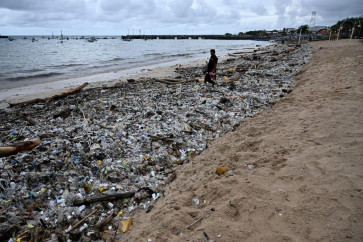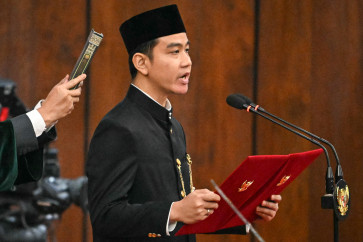Food, energy security may spark conflict
President Susilo Bambang Yudhoyono warns that food, energy and water security issues have the potential to spark conflict in the future, replacing ideological, religious and territorial motives
Change text size
Gift Premium Articles
to Anyone

P
resident Susilo Bambang Yudhoyono warns that food, energy and water security issues have the potential to spark conflict in the future, replacing ideological, religious and territorial motives.
He said here Wednesday that the world’s population of 6.6 billion people, which continually increases, will lead to a growing demand for food, water and energy.
“People will consume more and demand will increase,” Yudhoyono said. “The middle-class will keep growing and with its lavish lifestyle, it will need more resources.”
“I’m concerned,” he said. “If the world fails to prevent the possibility of interest clashes in the search and control over food, energy and water resources, these aspects will become new sources of global conflict and prompt wars.”
Yudhoyono was speaking at the opening of a two-day seminar themed, “Indonesia Toward 2025: Geopolitical and Security Challenges — Focus on Economy, Natural Resources and Energy” hosted by the Defense University.
The seminar is part of the university’s first anniversary celebration in March.
Yudhoyono said it was important for people working at, or closely-linked with, the country’s defense sector to understand the ever-changing global situation so they could adopt and implement security measures accordingly.
Chang Youngho of Singapore’s S. Rajaratnam School of International Studies, a speaker at the seminar, said it was necessary to develop regional cooperation to address energy security issues in Asia.
He said Asia faced challenges concerning the decreasing supply capacity of fossil fuel compared to growing energy demand. He also said countries in the region should fully cooperate to utilize their potential to use renewable energy resources to address the issue.
“Utilizing this potential requires energy markets in the region to integrate via energy infrastructure such as power grids and gas pipelines,” Chang said.
Another speaker, Theo Brinkel, International Security Studies associate professor from the Netherlands Defense Academy, suggested Asia use the EU as a role model in regional cooperation.
He said the EU was founded to meet the region’s need in the energy sector and had become a bloc with the strongest internal energy policy.
“Wherever member-states are prepared to join hands and act together, they have a better chance of achieving their goals,” Brinkel said.
Tsutomu Kikuchi, head and professor of the Department of International Politics at Japan’s Aoyama-Gakuin University, said, “The sheer scale of diversity and scope of diverging national interests have significantly impeded even the early efforts at coordination”.
He suggested that Indonesia take initiatives and “work responsibly toward the creation of international natural resource policies”. It should also integrate natural resource issues in its national strategy with regional and international groups it joined such as ASEAN, ASEAN+3, APEC and the G20 economic group.









